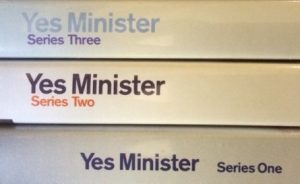Nothing is more important in a democracy’s election campaign than the rules about funding and spending by candidates for office. That is why the past few days’ shenanigans over the issue ahead of the island’s 7 October Assembly elections have looked so serious. A bit of humble-pie, quick-fixing and studied tolerance may see things through, but not without embarrassment.
The campaign spending rules for the election apply only from the start of the so-called “regulatory period”, namely 1 September, when candidates formally declare their intention to stand. The trouble is, the island now has political parties, and they have been able to register as contestants for months. How to restrict their spending has created an awkward conundrum, making the election even more of a novelty than it already is.
- It is the first to be held with the island as a single constituency, where elected deputies must represent the whole island, not parishes or their modern equivalent. To produce a valid vote, each voter must put an oval shape (not an ’X’) against up to 38 names onto a long ballot of machine-readable paper (39 or more would render the vote worthless). No one will be surprised if about 100 candidates stand for office.
- At a party level the battlefield is not quite what was anticipated. Two parties which quickly formed in 2019 – the Islanders Association and the 2020 Organisation – have both decided not to compete for seats. Indeed, they have failed dismally even to keep their websites up to date. At the time of writing, three parties will compete – the Alliance Party, the Guernsey Party and the Guernsey Partnership of Independents. The last-named does not want to call itself a party, but has registered as one in case it is ever challenged for operating as one. It has declared the names of 19 candidates, with perhaps more to come. The Guernsey Party has announced eight. The Alliance Party has at this point kept a relatively low profile.
- A crowd of individuals from all walks of life is expected to swell the throng of contestants well beyond this – deputies, former deputies, candidates previously defeated, former civil servants, professionals, workers, housewives, charity activists, one-issue campaigners. Members of parties will be identifiable as such on the ballot. Enthusiasts for local politics are already trying to calculate who is genuinely “independent.”
- A total of 31,300 people are on the electoral roll, about 60% of the population aged above 16. On a turnout of 70%, and assuming a third use all their 38 votes and the remainder about 20 on average, more than 635,000 votes will need to be counted. There is much speculation, given the task facing the voters, as to how many votes the 38th position will actually draw. We can expect a large number of postal votes.
- To help electors make their choices, a prominent group of individuals led by former Bailiff Sir Geoffrey Rowland have formed an independently-funded election support group with its own website. This aims to furnish professional and personal information about the background of individual candidates (that is, answering the question “Who are you?”), but not about their positions regarding political issues (that is, “Where do you stand on…?”).
- Regarding the latter, these will be compiled by the Registrar General from responses to selected questions from the public and be added to the manifestos submitted by the candidates. The information will be published in a booklet distributed to all households. The first question submitted from the public was: “Do you support a reduction in the cost of running the civil service? If so how would you do that and over what sort of timescale?” More like that and this could get interesting…
- Still, it is in the area of campaign spending where the emergence of parties has made things tricky. Candidates are limited to an amount of £6,000 in their spending on the campaign, estimated originally to be equivalent to a single mailshot to all households via Guernsey Post. In practice households will receive the manifesto information anyway, so the question arises of how the funds might best be spent. Candidates who are in parties can donate up to £3,000 of their allowed spending to the party, but the party is itself limited to £9,000 of spending in the regulatory period. All candidates can also claim up to £500 in out-of-pocket expenses.
- The most awkward question so far concerns spending incurred before the regulatory period begins. Guidance finally published six days before that period commences suggests candidates can spend money promoting themselves ahead of that but if the goods or services they purchase are then used during the regulated period, they must be accounted for. Parties, on the other hand, appear to have received carte blanche to spend whatever they wish before 1 September and have to limit themselves thereafter. It was this prior spending which prompted complaints of illegality and, for newer parties, unfairness. The clarification is controversial, but was accompanied by an official apology and appears to have avoided recrimination.
- Much water must pass under the bridge before we know how to distinguish the parties and individuals from each other. Thus far, the focus of attention has been on candidates for whom the election campaign has been under way for some time. For example, Gavin St Pier and Heidi Soulsby, who head the Guernsey Partnership (along with Lyndon Trott), have been talking publicly about forming a group of like-minded individuals since at least January 2018, largely out of frustration even then with the divisions in the assembly. Their eventual campaign launch this month was a very public affair – big auditorium, sound systems, lights, local media, internet feeds – plus they have a campaign manager, a website, and have obviously been able to capitalise on their high profiles. It was their seemingly premature advertisements which drew attention to the campaign funding problem in the first place. The official clarification appears to exonerate them of any suspected breach.
- Regarding possible outside observers who might provide an opinion on the fairness and dependability of the whole process, it is hoped that a small mission from the Commonwealth Parliamentary Association will conduct a review, Covid restrictions permitting. This is important given the fuss over campaign spending and, more widely, the disputed adequacy of corporate governance in certain committees in the past assembly term. As it is, Guernsey has no Election Commissioner; indeed, the mechanics of this new poll have been left to existing deputies, in particular the States Assembly and Constitution Committee, with essential input from the civil service, notably the Registrar General, and the Law Officers.
If on 7 and 8 October the counting machines don’t work smoothly the fall-back would be a rather agonising manual count, which could in turn delay the election of a new set of committees to form the next States. Either way, the actual transition is likely to be a fraught affair as individuals and parties jostle for position and bargain over votes for or against particular personalities and positions. This will be an unseemly process, and may belie claims by most candidates that they will “work together.” It therefore seems possible that the new assembly will only get into its stride in November – and even that is contingent upon the island remaining free of the Covid-19 disease. However, we should at least know whether so-called “island wide voting” has been worthwhile.
This article has been amended since initial publication to incorporate the proposed involvement of an observation mission to witness the election







